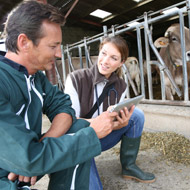
Dairy farmers say antibiotics could be cut by up to a third
Nine in 10 dairy farmers say that farming must take a proactive lead in the battle against antibiotic resistance, according to a new survey.
Figures published from the Antibiotic Use on Farm Survey - conducted by the Royal Association of British Dairy Farmers (RADBF) in collaboration with the University of Bristol - also show that dairy farmers think they could cut their antibiotic use by up to a third.
The survey of over 300 farmers, farm managers and farm workers followed the government-commissioned O’Neill Review of antimicrobial Resistance, published earlier this year.
Speaking in London yesterday (3 October), Dr Kristin Reyher from the University of Bristol’s School of Veterinary Science said her team was encouraged that dairy farmers thought it possible to achieve a median reduction of 30 per cent in antibiotic dry cow therapy use within the next five years.
"As well as this, reductions of 15 percent in antibiotic use to treat calf diseases – most probably pneumonia and calf scour - and 20 percent to treat clinical mastitis in milking cows are thought possible,” she said.
RABDF Council member and dairy farmer, Di Wastenage added the findings suggest that some of the motivation to reduce may come from further down the supply chain.
"Three-quarters of respondents in dairying said their milk purchaser was starting to ask about antibiotic use. Alongside this, 97 per cent thought the sector needed to be seen to be 'doing its bit' to tackle the issue, and 88 per cent agreed reductions needed to happen before they were forced to make them,” she explained.
Mrs Wastenage confirmed that the survey results will be fed into current farming industry initiatives to ensure and reduce the use of antibiotics, like those run by RUMA and CHAWG.
"There are opportunities to work with the British Cattle Veterinary Association and vet practices to explore more closely the way farmers and vets work together,” she said.
“Previous workfrom the University of Bristol tells us that vets sometimes feel pressured to prescribe antibiotics, even if farmers don’t mean to pressure them. Farmers have to be receptive to advice as well as vets being willing to deliver it – we can examine this more closely with RABDF members.”



 The Veterinary Medicines Directorate (VMD) is inviting applications from veterinary students to attend a one-week extramural studies (EMS) placement in July 2026.
The Veterinary Medicines Directorate (VMD) is inviting applications from veterinary students to attend a one-week extramural studies (EMS) placement in July 2026.